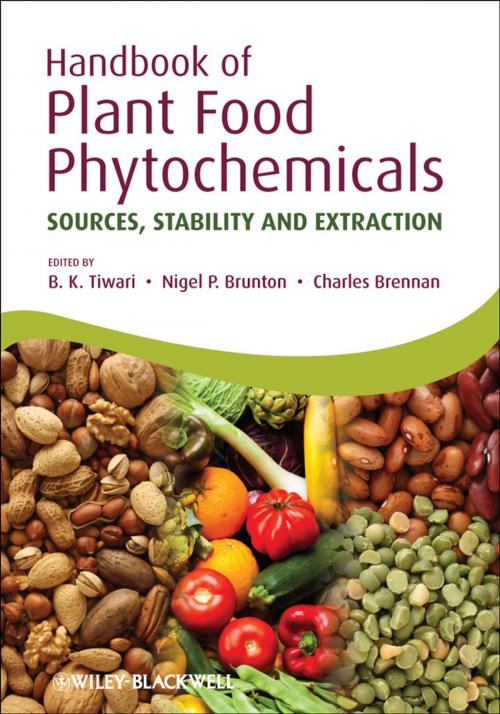Handbook of Plant Food Phytochemicals
Sources, Stability and Extraction
Nonfiction, Science & Nature, Technology, Food Industry & Science| Author: | ISBN: | 9781118464687 | |
| Publisher: | Wiley | Publication: | January 2, 2013 |
| Imprint: | Wiley-Blackwell | Language: | English |
| Author: | |
| ISBN: | 9781118464687 |
| Publisher: | Wiley |
| Publication: | January 2, 2013 |
| Imprint: | Wiley-Blackwell |
| Language: | English |
Phytochemicals are plant derived chemicals which may bestow health benefits when consumed, whether medicinally or as part of a balanced diet. Given that plant foods are a major component of most diets worldwide, it is unsurprising that these foods represent the greatest source of phytochemicals for most people. Yet it is only relatively recently that due recognition has been given to the importance of phytochemicals in maintaining our health. New evidence for the role of specific plant food phytochemicals in protecting against the onset of diseases such as cancers and heart disease is continually being put forward. The increasing awareness of consumers of the link between diet and health has exponentially increased the number of scientific studies into the biological effects of these substances.
The Handbook of Plant Food Phytochemicals provides a comprehensive overview of the occurrence, significance and factors effecting phytochemicals in plant foods. A key of objective of the book is to critically evaluate these aspects. Evaluation of the evidence for and against the quantifiable health benefits being imparted as expressed in terms of the reduction in the risk of disease conferred through the consumption of foods that are rich in phytochemicals.
With world-leading editors and contributors, the Handbook of Plant Food Phytochemicals is an invaluable, cutting-edge resource for food scientists, nutritionists and plant biochemists. It covers the processing techniques aimed at the production of phytochemical-rich foods which can have a role in disease-prevention, making it ideal for both the food industry and those who are researching the health benefits of particular foods. Lecturers and advanced students will find it a helpful and readable guide to a constantly expanding subject area.
Phytochemicals are plant derived chemicals which may bestow health benefits when consumed, whether medicinally or as part of a balanced diet. Given that plant foods are a major component of most diets worldwide, it is unsurprising that these foods represent the greatest source of phytochemicals for most people. Yet it is only relatively recently that due recognition has been given to the importance of phytochemicals in maintaining our health. New evidence for the role of specific plant food phytochemicals in protecting against the onset of diseases such as cancers and heart disease is continually being put forward. The increasing awareness of consumers of the link between diet and health has exponentially increased the number of scientific studies into the biological effects of these substances.
The Handbook of Plant Food Phytochemicals provides a comprehensive overview of the occurrence, significance and factors effecting phytochemicals in plant foods. A key of objective of the book is to critically evaluate these aspects. Evaluation of the evidence for and against the quantifiable health benefits being imparted as expressed in terms of the reduction in the risk of disease conferred through the consumption of foods that are rich in phytochemicals.
With world-leading editors and contributors, the Handbook of Plant Food Phytochemicals is an invaluable, cutting-edge resource for food scientists, nutritionists and plant biochemists. It covers the processing techniques aimed at the production of phytochemical-rich foods which can have a role in disease-prevention, making it ideal for both the food industry and those who are researching the health benefits of particular foods. Lecturers and advanced students will find it a helpful and readable guide to a constantly expanding subject area.















